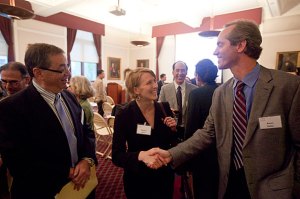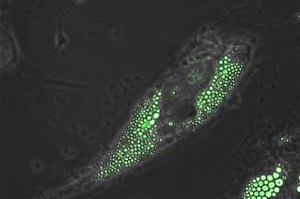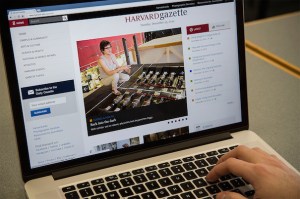Tag: Diabetes
-
Health
A strong start toward good health: Good choices
Lifestyle choices remain the best way to prevent heart attack, stroke, diabetes, cancer, and cognitive decline, panelists agreed.

-
Health
A pill to shed fat?
Harvard Stem Cell Institute researchers have taken what they describe as “the first step toward a pill that can replace the treadmill” for the control of obesity.
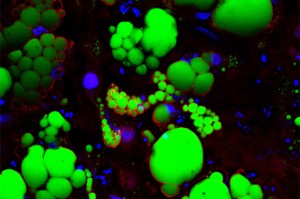
-
Health
Reprogramming cells, long term
Harvard Stem Cell Institute researchers have demonstrated that adult cells, reprogrammed into another cell type in a living animal, can remain functional over a long period. The work is an important advance in the effort to develop cell-based therapies for tissue repair, and specifically in the effort to develop improved treatment for diabetes.
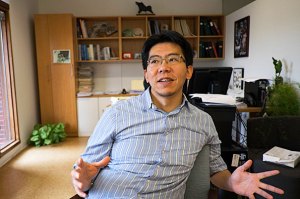
-
Health
Giant leap against diabetes
Harvard stem cell researchers announced a giant leap forward in the quest to find a truly effective treatment for type 1 diabetes, a disease that affects an estimated 3 million Americans.

-
Campus & Community
HSPH receives $24M gift
Murat Ülker, a leading entrepreneur in Istanbul, has contributed $24 million on behalf of the Ülker family to the Harvard T.H. Chan School of Public Health to establish the Sabri Ülker Center for Nutrient, Genetic, and Metabolic Research.

-
Health
Diabetes’ genetic variety
Harvard researchers working at the Broad Institute of MIT and Harvard have uncovered nine rare genetic mutations that dramatically increase the risk of developing type 2 diabetes. The discovery of the mutations highlights the dizzying genetic diversity of a disease rapidly spreading around the world.
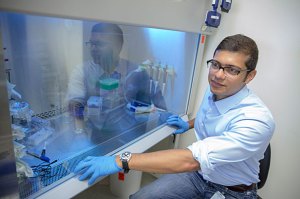
-
Science & Tech
Cheap and compact medical testing
Harvard researchers have devised an inexpensive medical detector that costs a fraction of the price of existing devices, and can be used in poor settings around the world.

-
Health
‘Broken genes’ for a broken system
To David Altshuler, the recent discovery of a genetic mutation that protects against type 2 diabetes offers hope in fighting more than just diabetes. It also illustrates how using the…
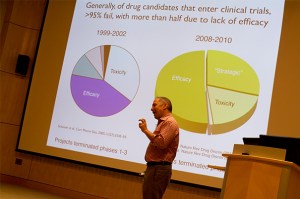
-
Health
A decade of breakthroughs
The Harvard Stem Cell Institute is now 10 years old. What began as an idea embracing cross-disciplinary research quickly became a generator of scientific discoveries.
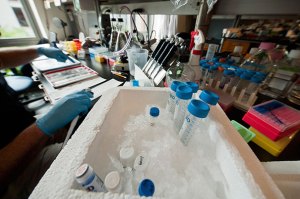
-
Health
Strategy for diabetes treatment
Harvard scientists have discovered a compound that inhibits insulin-degrading enzyme from breaking down insulin in the body.
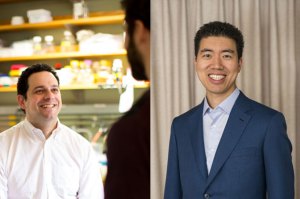
-
Health
Fighting disease on a global scale
The idea that the wave of diabetes, heart disease, and cancer breaking over the world is largely the result of wealth and inactivity is not only wrong, it’s counterproductive, says a Harvard research fellow who recently founded a nonprofit organization to fight disease.

-
Health
Potential diabetes breakthrough
Researchers at the Harvard Stem Cell Institute have discovered a hormone that holds promise for a dramatically more effective treatment of type 2 diabetes, a metabolic illness afflicting an estimated 26 million Americans.

-
Health
Weighing the benefits
A report by Harvard researchers has concluded that the benefits of stopping smoking far exceed the risks from any associated weight gain.

-
Health
Worldwide, women’s inequality
A U.N. official said Thursday that the world has made progress in reducing poverty and in meeting some of its eight Millennium Development Goals, but that entrenched inequality of women will slow efforts to meet equality and maternal mortality targets by 2015.

-
Health
Health in the balance
In research, treatment, and outreach, researchers from Harvard Medical School are taking on the childhood obesity epidemic in the United States. This is the first in a three-part series.

-
Campus & Community
The no-diet dietitian
Forget nutrition labels and calorie counting. Michelle Gallant, a clinical dietitian at Harvard University Health Services, is on a one-woman mission to teach how proper eating means trusting your gut.

-
Health
Obesity? Diabetes? We’ve been set up
The twin epidemics of obesity and its cousin, diabetes, have been the target of numerous studies at Harvard and its affiliated hospitals and institutions. Harvard researchers have produced a dizzying array of findings on the often related problems.

-
Health
New hope against diabetes
Results from a phase 1 drug trial by Harvard Medical School and Massachusetts General Hospital researchers showed that a decades-old tuberculosis drug knocked out the autoimmune cells that attack diabetic patients’ insulin-producing cells, followed by indications that pancreatic function was improving, albeit transiently.
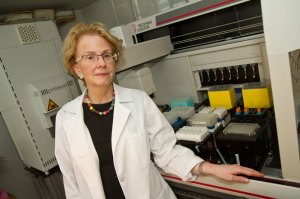
-
Health
Thinking ahead on diabetes
By measuring the levels of small molecules in the blood, doctors may be able to identify individuals at elevated risk of developing type 2 diabetes as much as a decade before symptoms of the disorder appear.

-
Health
Sick to death
Harvard School of Public Health researchers are mounting a major study of chronic disease in four African nations, which organizers hope will provide a foundation for understanding and treating chronic ailments like heart disease, diabetes, and cancer.

-
Campus & Community
HSPH professor awarded for diabetes research
Columbia University Medical Center presented the 2010 Naomi Berrie Award to Gökhan S. Hotamisligil, the James Stevens Simmons Professor of Genetics and Metabolism and the chair of the Department of Genetics and Complex Diseases at the Harvard School of Public Health.
-
Health
The rise of chronic disease
Heart disease, diabetes, and other chronic diseases are becoming enormous problems in the developing world and need more attention even as the challenge of fighting infectious diseases like AIDS shows no sign of abating, according to Institute of Medicine President Harvey Fineberg.

-
Health
Progress on obesity
Researchers have identified 18 gene sites associated with obesity and 13 associated with body fat distribution, helping to unravel the riddle of obesity.

-
Health
Challenge of finding a cure
A large, multidisciplinary panel has recently selected 12 pioneering ideas for attacking type 1 diabetes, ideas selected through a crowdsourcing experiment called the “Challenge,” in which all members of the Harvard community, as well as members of the general public, were invited to answer the question: What do we not know to cure type 1…
